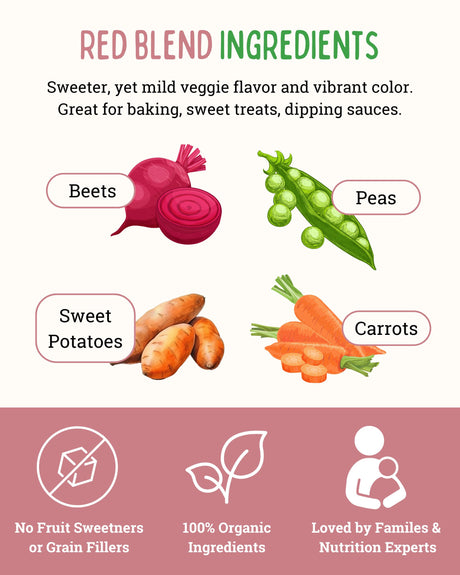Importance of Green Veggies in Children's Diets
Green veggies are nutritional powerhouses packed with vitamins, minerals, and antioxidants essential for children's growth and development. Incorporating these nutrient-rich foods into their diets can lay a solid foundation for lifelong health and well-being.
However, many children may resist eating green veggies, making it crucial to understand their benefits and find creative ways to introduce them into meals.
Green veggies are a nutritious and vibrant addition to daily meals, providing numerous health benefits to children. They support physical growth, enhance cognitive function, and promote emotional well-being, making them a vital part of a healthy diet. This blog will provide valuable insights for parents to encourage the consumption of green vegetables and promote overall health through creative meal planning and healthy eating habits.
Nutritional Value of Green Veggies
Nutrients Found in Green Veggies
Green veggies, including leafy greens like spinach and kale, and cruciferous veggies like broccoli and Brussels sprouts, are a variety of plant-based foods that provide essential nutrients for children's health, making them a valuable addition to children's diets.
Key Vitamins and Minerals in Green Veggies
Green veggies are rich sources of essential vitamins and minerals, supporting children's growth and development. These vitamins A, C, and K, along with essential minerals like calcium, potassium, and iron, are crucial for vision, immune function, collagen production, blood clotting, bone health, cardiovascular function, and red blood cell production and oxygen transport.
Importance of Fiber and Phytonutrients in Green Veggies
Green veggies, rich in fiber and phytonutrients, are essential for children's health. Fiber aids digestion, promotes satiety, and regulates blood sugar levels, reducing obesity and type 2 diabetes risk. Phytonutrients, like flavonoids, carotenoids, and glucosinolates, protect against chronic diseases and support overall health.
Physical Health Benefits

Supporting Growth and Development
Vegetables are essential for children's growth and development, providing essential vitamins, minerals, and antioxidants for bone health, muscle growth, and overall physical development. Their rich nutritional profile ensures proper bone formation, tissue repair, and immune function, laying the foundation for healthy growth and development from an early age.
Boosting Immune Function
Green veggies, rich in vitamins C, beta-carotene, and antioxidants, have immune-boosting properties that strengthen children's immune systems. These vegetables promote white blood cell production, fighting off bacteria and viruses. Their antimicrobial properties protect against common illnesses, ensuring children remain healthy and resilient year-round.
Promoting Digestive Health
Green veggies are a vital source of dietary fiber, which prevents constipation and promotes digestive health. They add bulk to stool, promote regular bowel movements, and aid in waste elimination. The diverse phytonutrients in green veggies nourish the gut microbiota, promoting overall gut health and a healthy balance of beneficial bacteria.
Cognitive Benefits
Enhancing Brain Function
Green veggies are not just beneficial for physical health; they also play a crucial role in enhancing brain function in children. Nutrients like folate, vitamin K, and antioxidants found in green vegetables support optimal brain health and cognitive function.
Folate, for example, is essential for the production of neurotransmitters like serotonin and dopamine, which regulate mood and behavior. Meanwhile, vitamin K supports the formation of myelin, a protective sheath around nerve fibers that enhances signal transmission in the brain. Regular consumption of green veggies ensures a steady supply of these nutrients, promoting overall brain function and mental clarity in children.
Supporting Cognitive Development
Green veggies are essential for cognitive development, providing essential nutrients like choline, lutein, and zeaxanthin. These nutrients are crucial for the brain's rapid growth and maturation during infancy and early childhood. Choline is essential for neurotransmitter formation, memory, and learning processes, while lutein and zeaxanthin protect against oxidative damage, supporting visual and cognitive function.
Improving Focus and Attention
Green veggies, rich in essential nutrients like magnesium and vitamin B6, play a crucial role in neurotransmitter synthesis and regulation, influencing mood, concentration, and attention span. These nutrients, particularly dopamine, support the function of the neurotransmitter dopamine, thereby enhancing cognitive function and promoting focus and attentiveness in children.

Emotional Well-Being Benefits
Regulation of Mood
Green veggies, like leafy greens, are rich in folate and play a crucial role in regulating mood in children. These nutrients, including serotonin and dopamine, are essential for emotional balance and happiness. Incorporating green veggies into children's diets can help parents support the production of these mood-regulating neurotransmitters.
Reducing Stress and Anxiety
Green veggies, rich in magnesium and antioxidants, can help reduce stress and anxiety in children. Leafy greens like spinach and kale relax muscles and calm the nervous system, reducing tension and anxiety.
Incorporating green veggies into children's meals can provide essential nutrients, support stress resilience, and promote emotional well-being, thereby reducing anxiety and promoting overall health.
Promoting Overall Emotional Health
Green veggies are essential for children's emotional well-being, providing essential vitamins, minerals, and antioxidants. A balanced diet rich in green vegetables supports children's resilience and ability to cope with life's challenges. Involving children in the selection and preparation of green veggies fosters a positive relationship with food and a healthy attitude towards eating.
Strategies for Incorporating Green Veggies into Kids' Diets
Creative and Fun Ways to Serve Green Veggies
Making green veggies appealing to kids involves creating creative and engaging presentations. Parents can use colorful skewers, cookie cutters, or create veggie-based snacks with kid-friendly flavors. By making green veggies visually appealing and fun to eat, children are more likely to be receptive to trying them.

Involving Kids in Meal Planning and Preparation
Meal planning and involving children in the process can boost their willingness to eat green veggies. By allowing them to pick their favorite vegetables and participate in the kitchen, they develop valuable cooking skills and a sense of ownership in their food choices.
Sneaky Ways to Hide Green Veggies in Favorite Dishes
An effective strategy for children resistant to green veggies is to sneak them into their favorite dishes. Parents can puree green veggies like spinach, kale, or broccoli and add them to sauces, soups, or smoothies without altering taste. This strategy increases children's intake of essential nutrients without resistance.
Overcoming Challenges and Resistance
Dealing with Picky Eating Habits
Picky eating habits are common among children and can pose a challenge when trying to incorporate green veggies into their diets. Green veggies are essential for children's healthy eating habits, but they can be challenging to incorporate.
Parents can help by offering a variety of green veggies in various forms and preparations, demonstrating positive attitudes towards them, and avoiding pressuring them to eat unhealthy foods.
Addressing Texture and Taste Preferences
Texture and taste preferences play a significant role in children's acceptance of green veggies. Some kids may dislike certain textures or find certain flavors too strong. To address this, parents can experiment with different cooking methods, such as roasting, steaming, or sautéing, to alter the texture of green veggies and make them more palatable.
Additionally, incorporating flavorful sauces, herbs, or seasonings can help mask any bitterness or unfamiliar tastes, making green veggies more appealing to kids.
Encouraging Persistence and Patience
Research shows that children often reject green veggies, but persistence and patience are crucial. Encouraging persistence and positive reinforcement can help develop healthy eating habits. By consistently including green veggies in meals and snacks, parents can help their children develop nutrient-rich habits and enjoy the fruits of their labor.
Tips for Creating a Positive Food Environment
Modeling Healthy Eating Habits
Parents play a crucial role in shaping their children's eating habits by modeling healthy behaviors and incorporating green veggies into their meals. This role encourages children to explore and embrace new foods, promoting a healthier lifestyle.
Offering a Variety of Green Veggies
Variety is key when it comes to encouraging children to eat green veggies. Encouraging children to eat a variety of green veggies is crucial for their nutritional benefits. By rotating familiar favorites like broccoli and spinach with new ones like kale, Brussels sprouts, and asparagus, parents can provide a diverse and appealing experience for their children.
Making Mealtime Enjoyable and Stress-Free
Creating a positive and relaxed atmosphere during mealtimes can help encourage children to try new foods, including green veggies. Parents can foster a stress-free environment by avoiding power struggles over food and instead focusing on making mealtime enjoyable and pleasant.
This can involve engaging in conversation, setting a welcoming table, and involving children in meal preparation. By turning mealtime into a positive and enjoyable experience, parents can help their children develop healthy eating habits that include plenty of green veggies.
Importance of Role Modeling and Education
Setting a Positive Example
Parents serve as powerful role models for their children when it comes to food choices and eating behaviors. By consistently demonstrating a positive attitude toward green veggies and incorporating them into their own meals, parents can influence their children's attitudes and preferences.
When children observe their parents enjoying green veggies as part of a balanced diet, they are more likely to view these foods positively and be open to trying them.
Educating Children About the Benefits of Green Veggies

Educating children about the nutritional benefits of green veggies can help them understand why these foods are important for their health and well-being. Parents can engage their children in age-appropriate conversations about the vitamins, minerals, and fiber found in green veggies and how these nutrients support growth, development, and overall health.
Teaching children about the specific benefits of different types of green veggies can also pique their interest and encourage them to include these foods in their diet.
Encouraging Exploration and Trying New Foods
Green veggies are a great addition to any meal, and involving children in grocery shopping and meal preparation can help them explore and try new foods. Parents can build their children's confidence and willingness to experiment with different green veggies, creating a supportive environment that promotes healthy eating habits.
Summary
Green veggies offer a wealth of health benefits for kids, including essential nutrients like vitamins, minerals, and fiber. These nutrients support physical growth, cognitive development, and emotional well-being. Incorporating green veggies into children's diets can help boost their immune function, enhance brain function, regulate mood, and promote digestive health.
Importance of Including Green Veggies in Children's Diets
It's crucial for parents to prioritize green veggies in their children's diets to ensure they receive the necessary nutrients for optimal growth and development. By introducing a variety of green veggies from an early age and encouraging positive eating habits, parents can help set the stage for a lifetime of healthy eating.
As parents and caregivers, we play a significant role in shaping our children's eating habits and attitudes toward food. By making green veggies a regular part of family meals and snacks, we can instill a love for nutritious foods and provide our children with the foundation they need to thrive. Let's embrace the power of green veggies and prioritize their inclusion in our children's diets for their health and well-being.
Leave your comments below; we love to hear from you! And don't forget to follow EasyPeasie for more veggie info and convo on YouTube, Facebook, and Instagram! ~ThePeas













